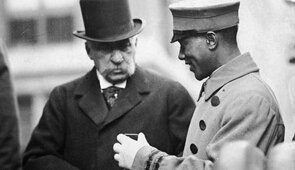(单词翻译:单击)

Dear Annie: My company is on a June fiscal year, so we’re having our annual round of employee evaluations now, and mine was (again) pretty discouraging. I’m really good at what I do, with great technical skills, which my boss acknowledged. But he also said I’m not ready to move up to the next level of management because I lack “executive presence.”
亲爱的安妮:我的公司在六月份结束一个财政年度,因此我们现在正在进行一年一度的员工绩效评估,而我的评估结果(再一次)令人失望。我对自己的工作非常擅长,有着出色的技术能力,我的老板也承认这一点。但他说我还没有做好在管理岗位上更进一步的准备,原因是我缺少“高管风度”。
One of the reasons I left my last employer was that my boss at that company kept saying I was “not ready” for a promotion despite being great at my job, so unfortunately this isn’t the first time I’ve heard this. But what can I do about it? What exactly does “executive presence” mean, anyway? —Stymied Again
我之所以离开上一家公司,原因之一正是由于那家公司的老板总是认为,虽然我的工作非常出色,但我还没有做好升职的“准备”。所以,很可惜。这已经不是我第一次听到同样的评语。但我该怎么办?“高管风度”到底指的是什么?——S.A.
Dear Stymied: Interesting question, since “executive presence” often determines whose career takes off like a rocket and whose doesn’t. Yet it’s hard to define. Most of us know it when we see it, in any CEO or public figure who commands attention with a seemingly magical combination of charisma and credibility. And, since this kind of personal magnetism seems to come naturally to the people who’ve got it (which is usually a carefully cultivated illusion, but more about that in a minute), it’s tempting to think you have to be born with it.
亲爱的S.A.:很有意思的问题,因为“高管风度”往往会决定谁将一飞冲天,而谁将停滞不前。但我们很难明确定义什么是“高管风度”。如果我们看到万众瞩目的CEO或者公众人物,他们像变魔术一样将超凡魅力与可信度组合在一起,这时大多数人都会知道什么是“高管风度”。而由于这些人似乎自然而然地表现出这些个人魅力(其实它通常是一种精心培养出的错觉,稍后会详细谈到这一点。),因此我们禁不住会想,这些气质肯定是与生俱来的。
Wrong, according to Sylvia Ann Hewlett, author of a new book called Executive Presence: The Missing Link Between Merit and Success. She set out to break “executive presence” down into its component parts and then analyze each one, relying partly on a detailed survey of 268 senior executives.
《高管风度:优点与成功之间缺失的环节》(Executive Presence: The Missing Link Between Merit and Success)一书的作者西尔维娅•安妮•休利特认为,这种观点大错特错。她对268位资深高管进行了详细调查,据此将“高管风度”进行了分解,并对每一个部分进行了分析。
Your situation isn’t unusual, she says. Lots of people are terrific at what they do, but they hit a plateau mid-career for the same reason. “It isn’t a question of competence at your job,” she says. “It’s a question of getting people to give you the chance to prove you are capable of more.” Learning the subtle tricks that add up to executive presence is often how people get that chance, and “it’s not as complicated as it may seem.”
她表示,你的情况很常见。许多人在本职工作中表现出色,但却因为同样的原因,在职业中期遭遇瓶颈。她说:“这与一个人在本职工作中的能力无关。而是要让人们给你机会,证明自己能够做到更多。”学会构成高管风度的那些微妙技巧,往往可以帮助人们得到那个机会,而且这个过程“并没有看起来那么复杂。”
The executives in Hewlett’s study pinpointed three essential elements of “presence”: Gravitas (how you act), communication (how you speak), and appearance (how you look). Gravitas, especially confidence in your own abilities and knowledge, is by far the most important of the three, according to 67% of those polled, although it overlaps a lot with communication, which got 28% of the vote. Appearance—by which the executives in the survey meant mostly grooming and fitness, not movie-star good looks—came in at a tiny 5%.
休利特调查的高管指出了“高管风度”的三个基本要素:庄重(如何举止),沟通(如何说话)和外貌(外表如何)。庄重,尤其是对自身能力与知识的自信,是三者之中最重要的一项。67%的受访者选择了该项,虽然它与沟通有许多重合之处。选择沟通的受访者比例为28%。受访的高管们认为外貌应该是指仪表和健康,而不是像电影明星一样俊朗帅气的面容。选择这一项的比例仅有5%。
Luckily, all of these can be learned, and Executive Presence tells how. Take gravitas, for instance. Hewlett defines it as “grace under fire” and the self-confidence to stay calm in high-pressure situations, but there’s more to it than that.
幸运的是,这三项都可以通过学习掌握,具体方式可以从《高管风度》一书中找到答案。以庄重为例,休利特把它定义为“临危不惧”,即便面临高压局面依旧能够保持冷静的自信,但这只是一个方面。
“A big part of gravitas is a knack for conveying tremendous amounts of knowledge and giving people the impression you could go ‘six questions deep’ on the subject you’re talking about, but in a way that’s concise,” Hewlett explains. “Attention spans are so short now that, whether it’s in a speech or in a meeting, you have to show how you can add value in a way that’s both compelling and brief.”
休利特解释说:“组成庄重的很大部分是一种技巧,一种传达海量知识的技巧,并且要给人留下这样一种印象——对于正在谈论的话题,你甚至可以通过“6个问题来深入探讨”,但你采用的是一种简洁的方式。不论是在演讲还是会议过程中,人们的注意力持续的时间非常短。因此,你必须能证明,自己如何通过一种激发兴趣的简短方式来增加价值。”
The most charismatic leaders do this while seeming as if their remarks are off the cuff—and Hewlett says anyone can pull it off, through practice, practice, practice.
最具有个人魅力的领导者在这样做的时候会给人一种感觉,他们的话都是信手拈来——休利特认为,只要坚持不懈地练习,任何人都可以做到。
Delivering a painstakingly prepared message, while seeming to talk off the top of your head, doesn’t come naturally to anybody, even if it looks that way. When Hewlett was a graduate student at Harvard many years ago, her faculty advisor was the late economist John Kenneth Galbraith, a famously riveting public speaker. His secret, he once told her, was that he rewrote every speech 12 times. Then, he said, “I introduce a note of spontaneity in the thirteenth draft.”
既要传达煞费苦心准备的信息,又要让自己看起来是在脱口而出侃侃而谈,没有人天生便具有这种能力,即便表面看起来好像如此。许多年前,休利特在哈佛大学(Harvard)读研究生时,他的指导教授是已故的经济学家约翰•肯尼斯•加尔布雷斯,也是一位令人着迷的著名演说家。他告诉休利特,自己的诀窍是每一篇演讲稿都要重写12遍。然后,他说道:“到第13遍时,就有了一种即兴感。”
Maybe you’re pretty good at this already. You don’t say whether your boss went into any detail about exactly why he thinks you lack executive presence, but if not, your first step should be to ask him. “Ask for honest feedback about why this boss sees you this way,” Hewlett says. “Make it very clear to him or her that you really want to know, and that you’re not going to take it personally or get defensive.”
或许你对此已经非常擅长。你没有说老板是否曾详细解释过他为什么认为你缺乏高管风度,如果对方没有解释,你的第一步应该是主动追问。休利特说:“对于老板为什么会对你有这样的看法,应该寻求诚实的反馈。要让对方清楚,你真诚地想要知道原因,但你不会把它视为对个人的攻击,也不会采取自我防卫的态度。”
Mentors can be a big help in telling you exactly where you need to polish the skills that add up to executive presence. So if you haven’t got a mentor, now might be a good time to find one—ideally a higher-up you don’t report to directly. Good luck.
导师会提供巨大的帮助。他会告诉你需要磨练哪些技能,来培养自己的高管风度。如果你没有导师,或许现在就应该找一位——理想的人选是与你没有直接上下级关系的高层。祝你好运。
Talkback: Have you ever been told you “lack executive presence” or were “not ready” for a bigger job? What did you do about it? Leave a comment below.
反馈:是否曾有人评价你“缺乏高管气度”或“没有做好准备”接受一个更高的职位?你如何解决这样的问题?欢迎留言评论。


